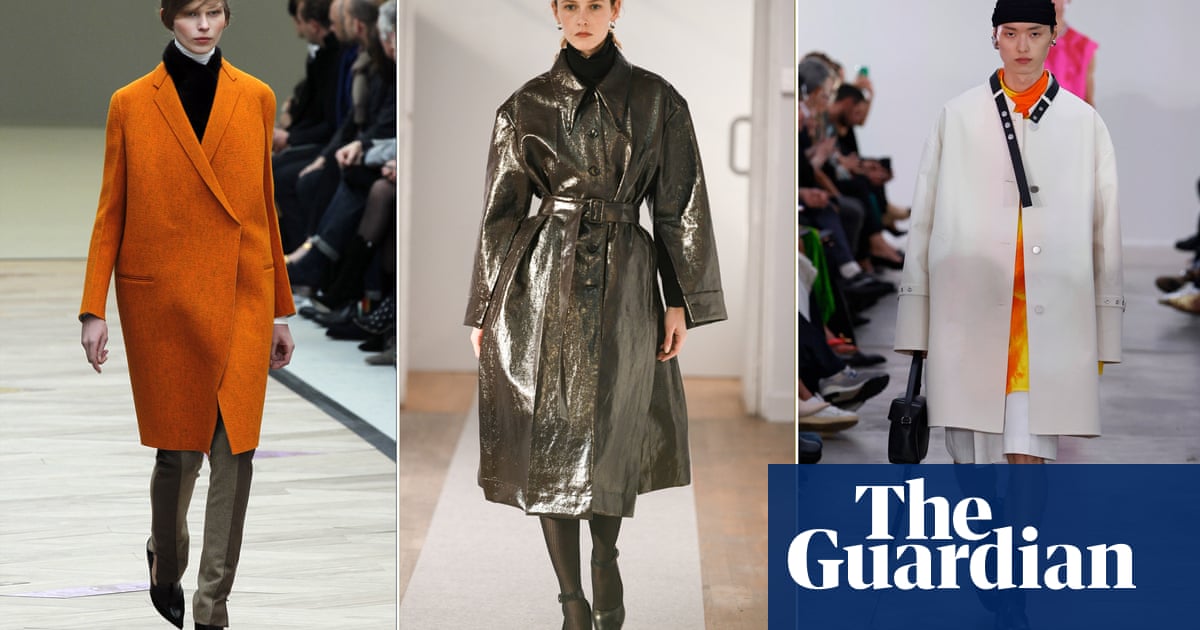Good coats live in my imagination more than any other garment. Most runway images I save are perfectly shaped, oversized long wool coats, with wide lapels, exaggerated shoulders and raglan sleeves. They are almost always double-breasted and made by such designers as The Row, Lemaire, Phoebe Philo and Jil Sander. Most of the time I can’t bring myself to look at the price tags.
“The amazing thing about coats, which isn’t true of any other item of clothing, is their ability to redefine an entire look and profile,” says a Melbourne-based stylist, Emma Boseley. Since they go over your outfit and hold a shape of their own whether it’s cocoon, oversized or tailored, “they have the potential to play with volume and scale”.
But a good coat can be a big investment, especially now given the rising cost of natural fibres. But since “a well-made coat should last a lifetime”, according to Esse Studios’ creative director, Charlotte Hicks, it’s possible to buy a coat that looks straight off the runway for a fraction of the price secondhand – if you know what you’re looking for.
Find your favourite style
If you’re not in the habit of saving photos from runway shows, you’ll probably need to do some research. Boseley recommends examining current catwalk styles. “Start your research based on silhouettes you like and build from there,” she says. Fashion magazines including Vogue, Elle and Harper’s Bazaar offer roundups of runway trends with accompanying imagery.
While fashion does evolve quickly, something interesting has been happening in coat trends for the last decade or so – the best styles are all exaggerated silhouettes from the past. “When you look at what we are seeing now, it really is a pastiche of all the decades gone,” Hicks says. “Whether it’s the opulent wider lapels of the 30s, the relaxed double-breast of the 80s or the more suppressed waist from the 50s, it’s all sort of there.”
Boseley says the floor-length tailored coats we are seeing in both single- and double-breasted styles and with big shoulders are an “an ode to 1980s power dressing”.
The hourglass shape that comes in a shorter length, with tailored features and a cinched waist, are reminiscent of the late 40s and early 50s that came back in the late 70s and 80s. “I love how sexy this style of coat can make you feel,” she says.
Her other favourite trends include the classics: cropped and full-length trenchcoats and leather jackets.
Tips for buying vintage coats online
Once you have a sense of what you’re looking for, it’s time to scour vintage and resale stores and websites. “It’s amazing what you’ll find when you can be precise about what you are looking for,” Boseley says.
While luxury online resale stores offer a big range, it can be tricky to buy a coat online. Without trying it on it’s hard to get a sense of the fabric quality, length and volume.
Boseley has had success buying winter coats from local and international secondhand stores including Grailed and Buyee – the latter for special preloved pieces by Japanese designers. Other options include Vestiaire Collective and ReSee. For a mix of designers and high-street brands there’s Depop, eBay, The Turn and Facebook Marketplace.
To be sure of the coat’s proportions, ask the seller for its measurements when the coat is lying flat with its buttons done up. Pay attention to the shoulder width, sleeve length, the measurement across the chest from armpit to armpit, and the length from shoulder to hem, including where the waist sits. If you have a coat you love, measure it up and use it as a reference point.
after newsletter promotion
Try before you buy
There’s no shortage of vintage and secondhand stores, resellers and op shops that make it possible to try coats on before you buy them. If you’re going shopping for an outer layer, Boseley advises dressing in an outfit you’d like to wear underneath it – “That way, when trying it on, you can check the proportions with a holistic view as to how it works with the garments underneath as well as the proportions of your body.”
Then check that the collar and the lapels sit evenly around your neck and against your chest, and consider how well their proportions work with your height and frame. Make sure the pockets are in the appropriate place so they don’t upset the silhouette and are deep and sturdy enough to hold your phone (or your hands when it’s cold).
Finally, Boseley advises women: “Keep an open mind and look in the men’s section, where you can find excellent trench or structured coats.”
Give a vintage coat a refresh before you wear it by taking it to a dry cleaner or going over it with a lint roll. “This takes away any muskiness and gives them a new lease of life,” the stylist says.
Fabric is king
Whether you’re buying online or in person, pay attention to the fabric composition of the coat as this will tell you a lot about how it will wear. Ideally, a winter coat should be 100% wool or a wool and cashmere blend.
To get a sense of how well the fabric will wear, rub it between your fingers to ensure it doesn’t pill easily and has an appropriate density: a thinner, fluffy fabric will not be as durable. Make sure it’s lined, preferably with viscose rayon, cupro or silk. Lining will help keep you warm, keep the outer layer of the coat clean and make it more comfortable to take on and off.
Synthetic fibres such as polyester or nylon blended into the main fabric or lining suggest costs have been cut and the coat will not be as effective at thermoregulation.
High-quality fabric will mould to your body and fall to make the coat look polished and sharp. “It’s a beautiful recipe of fabric, fit, interlinings and construction that all come together,” Hicks says.

